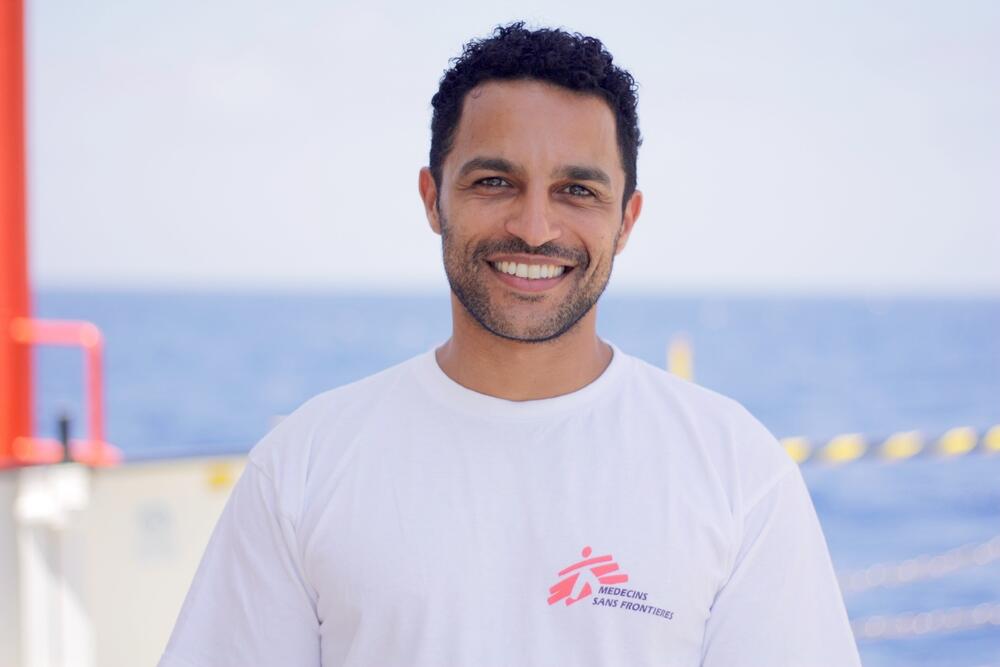Explainer: Why is MSF treating people seeking asylum in the UK?
Médecins Sans Frontières / Doctors Without Borders (MSF) is now providing primary healthcare to people seeking asylum in the UK who are being held at the large-scale containment site at Wethersfield in Essex.
The project – which is being run in partnership with Doctors of the World (DOTW) UK – was launched after an assessment of the physical and mental health needs of the group. We are concerned about the serious health-related harms caused by containing people in such sites, as we have seen from our projects on the Greek islands.
News: MSF launches UK operation
MSF has a long history of supporting refugees and displaced people around the world, and this is the first time that we have opened a project working with people seeking safety in the UK.
But why would an organisation known for operating in conflict zones and natural disasters need to intervene in such a way?
1 | Is there a humanitarian crisis at Wethersfield?
Around 650 men seeking asylum are currently held at Wethersfield in former military barracks. The Home Office plans to increase this number to 1,700 this year.
However, we are seriously concerned about living conditions at the site and their negative impact on physical and mental health.
MSF carried out an assessment with men being held there, who told us their specific medical needs were not being met. We have since carried out medical consultations and found that people have poor mental health and are showing signs of distress.
Many of these are caused by a combination of the circumstances that forced people from their homes in the first place, their journey to the UK, the environment in which they are being held and the nature of the UK asylum process.
This dire mental health situation is a particular concern.
People seeking asylum are often vulnerable and may have already lived through extremely traumatic experiences such as conflict, violence and persecution. The people being held at Wethersfield have told us that their mental health has worsened since their arrival.
The former RAF site is also very isolated. It is heavily surveilled by CCTV and security guards and is surrounded by fences and barbed wire. This has exacerbated the situation for many people who tell us it feels like a prison.
Sadly, we anticipate that the medical situation will only deteriorate as time goes on – asylum claims have been stuck in limbo since the Illegal Migration Act became law and the number of people held at the site is set to increase.
2 | Can the UK Government provide this care?
The UK Government is of course able to provide this care, but it chooses not to.
The Home Office provides on-site primary healthcare, including access to a GP. However, mental healthcare is not provided at the site and many men we have spoken to tell us their needs are not being met.
Ideally, we’d much rather that our intervention at Wethersfield wasn’t needed. However, as a neutral, impartial and independent humanitarian organisation, MSF operates based on medical needs alone.
There is a gap in healthcare that should not exist, and we are pushing for the Government to abandon its inhumane approach.
Until then, we will continue to fill the gap and treat people in need.
3 | Why is MSF taking action to help this group?
Since our founding in 1971, MSF has delivered medical aid to people who have been forced to flee their homes and face limited access to care. Our staff are experts at helping those who have escaped often traumatic situations and are seeking safety.
The people we are supporting at Wethersfield are being actively subjected to ‘deterrence measures’ that involve the threat of being forcibly expelled to Rwanda and indefinite containment. We know from the experience of MSF teams around the world that these specific practices can cause horrendous physical and psychological harm.
In Greece, for example, MSF staff have worked since 2016 to treat the devastating humanitarian consequences of EU migration policies that have forced thousands of people seeking asylum into overcrowded detention centres and camps on the islands of Samos and Lesvos. Unbelievably, it is an approach that the Home Office is openly emulating here in the UK.
This is a recipe for disaster that will cost lives. Something which, sadly, has already come to pass with the suicide of a man held on board the Bibby Stockholm – the UK government’s ‘migrant barge’.
Importantly, this is also not the first time that MSF has worked in the UK.
During the COVID-19 pandemic, we partnered with University College London Hospitals to provide testing, accommodation and care to homeless people in the capital.
Around the world, we go wherever the need is greatest to treat people regardless of their race, religion, politics or nationality.
4 | Is this a political publicity stunt?
Put simply, no.
This is a humanitarian response to medical needs in a group of vulnerable people who have been targeted by punitive anti-migration deterrence policies
This kind of work is at the core of MSF projects around the world and the principles and charters that guide us. These same commitments also require us to speak out about what we see and insist on political responsibility.
The fact is that several of the UK’s migration policies carry the potential for serious human suffering.
These include ‘offshoring’ (such as the so-called ‘Rwanda plan’), indefinite containment, and the failure to provide adequate healthcare.
Alongside our medical work, we will continue to liaise directly with the Government and bear witness to what we are seeing in the hope that the Home Office will drop its harmful policies.
To be clear, in the UK and across Europe the so-called ‘migration crisis’ is a manufactured crisis. It is pointlessly cruel and driven by governments and politicians regardless of its human cost.
But there is another way.
The UK Government could abandon its misguided deterrent approach, provide safe routes and treat people seeking safety humanely.
We will then be very happy to cease our operations in the UK.
MSF, refugees and displaced people
An unprecedented 108.4 million people around the world have been forced from their homes, according to UNHCR.
The reasons vary, but violence and conflict; natural disasters; or extreme weather events can all mean that it is no longer safe to stay where you are.
An estimated 35.3 million of these displaced people are refugees: people who have had to travel to a new country to find safety. Worldwide, over half of all refugees are under the age of 18.

